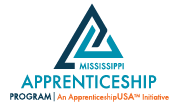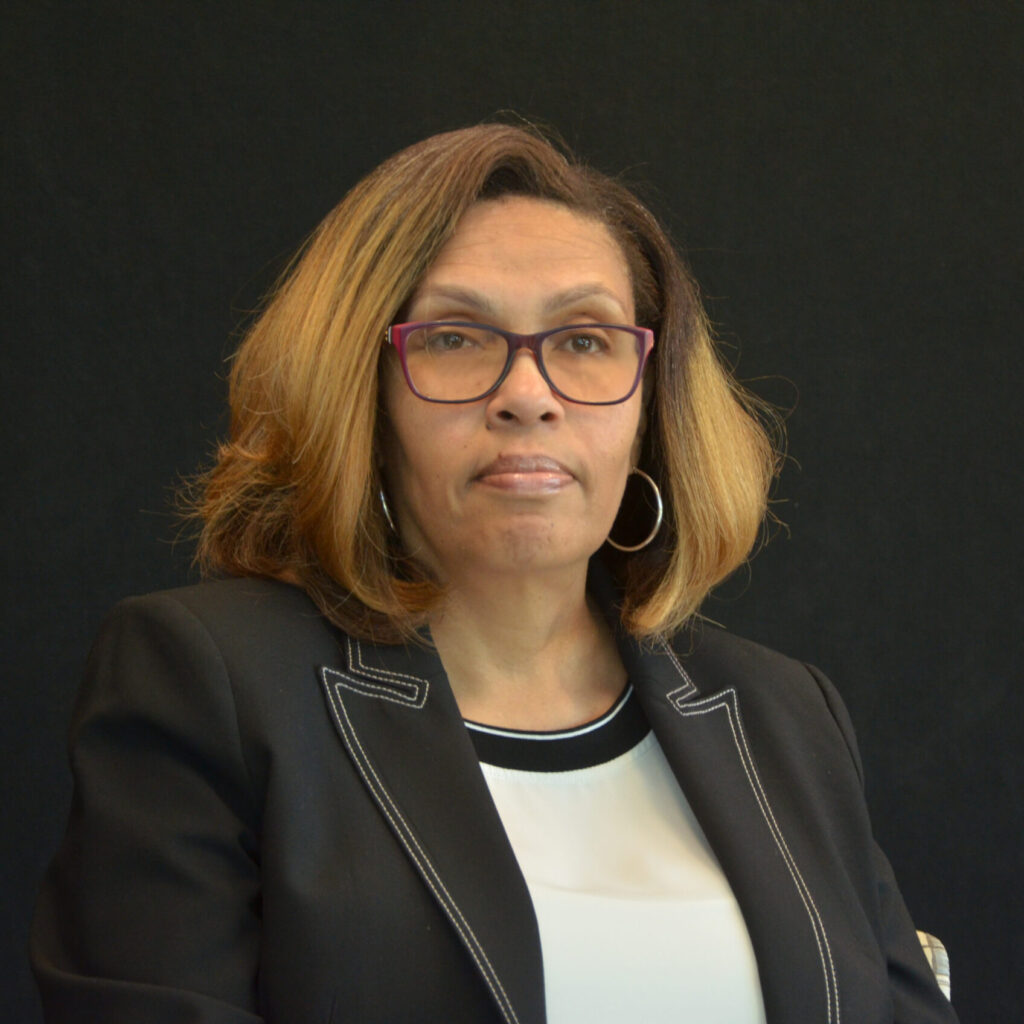About
The Mississippi Apprenticeship Program (MAP) helps companies, regardless of size, develop a Registered Apprenticeship (RA) program from the initial concept phase to registration and subsequent implementation within the company. Recognizing that RA is business driven, MAP works closely with companies to identify the occupations and skill sets needed on their job site and build out an RA program designed to meet their needs.
RA is a proven strategy for helping businesses grow their own skilled workforce through a combination of customized and rigorous on-the-job training and related classroom instruction.
As Registered Apprenticeship (RA) continues to grow and diversify across the country, more individuals and organizations are getting involved in apprenticeship work. Launching a program or finding the right RA program to meet your career goals might seem difficult. However, the Mississippi Apprenticeship Program (MAP) has the tools and resources you need to navigate the apprenticeship process.
Our Dedicated Staff
The Mississippi Apprenticeship Program (MAP) staff helps companies develop, expand, and retain Registered Apprenticeship (RA) programs. Our team works with companies from the initial concept phase, registration, connection to funding sources, implementation within the company, and marketing the program. Recognizing that RA is business-driven, the MAP team works closely with companies to identify the occupations and skillsets needed on their job site and builds customized RA programs designed to meet these companies’ needs.
These customized RA programs assist companies in growing and training their skilled workforce, which supports Mississippi’s economic growth and community development. For more information on RA, please feel free to contact a MAP team member or contact us by email at apprenticesinfo@mdes.ms.gov or call 601-321-6000.
FAQS
General
Apprenticeship is an arrangement that includes a paid-work component and an educational or instructional component, where individuals obtain workplace-relevant knowledge and skills.
Registered Apprenticeships are high-quality, work-based learning, and post-secondary, earn-and-learn models that meet national standards for registration with the U.S. Department of Labor (or federally-recognized State Apprenticeship Agencies).
Registered Apprenticeship training is distinguished from other types of workplace training by several factors: (1) participants who are newly hired (or already employed) earn wages from employers during training; (2) programs must meet national standards for registration with the U.S. Department of Labor (or federally-recognized State Apprenticeship Agencies); (3) programs provide on-the-job learning and job-related technical instruction; (4) on-the-job learning is conducted in the work setting under the direction of one or more of the employer’s personnel; and (5) training results in an industry-recognized credential.
The U.S. Department of Labor’s Office of Apprenticeship, works in conjunction with State Apprenticeship Agencies to administer the program nationally. These agencies are responsible for registering apprenticeship programs that meet federal and state standards; protecting the safety and welfare of apprentices; issuing nationally-recognized and portable Certificates of Completion of Apprenticeship to apprentices; promoting the development of new programs through marketing and technical assistance; assuring that all programs provide high-quality training; and assuring that all programs produce skilled and competent workers. In addition, a wide variety of stakeholders exist – including state organizations, industry associations, educational organizations (both secondary and post-secondary), workforce development organizations, economic development organizations, community-based organizations, and others. These stakeholders have a substantial interest in its success of registered apprenticeship.
The length of an apprenticeship program can vary depending on the employer, the complexity of the occupation, and the type of program. Registered Apprenticeship programs typically range from one year to six years. During the program, the apprentice receives both structured, on-the-job training and job-related education. For each year of the apprenticeship, the apprentice will normally receive 2,000 hours of on-the-job training, and a recommended minimum of 144 hours of related classroom instruction.
If you would like to meet with someone from the Mississippi Apprenticeship Program, please email apprenticesinfo@mdes.ms.gov or call 601-321-6000.
For Apprentices
Yes, apprentices start working from day one with incremental wage increases as they become more proficient. The average starting wage for an apprentice is approximately $15.00 per hour.
Apprentices earn competitive wages, a paycheck from day one and incremental raises as skill levels increase. The average wage for a fully-proficient worker who completed an apprenticeship translates to approximately $60,000 annually. Apprentices who complete their program earn approximately $300,000 more over their career compared to non-apprenticeship participants.
Today, most apprenticeship opportunities include on-the-job training and classroom instruction provided by apprenticeship training centers, technical schools, community colleges, and four-year colleges and universities, sometimes through distance learning. Often apprenticeship sponsors work directly with community colleges that do provide college credit for apprenticeship experience.
After completion of an apprenticeship program, the apprentice earns a nationally recognized credential from the U.S. Department of Labor that is portable and stackable. Additionally, an apprentice earns a paycheck throughout the apprenticeship and the potential for increased pay and upward career opportunities.
Apprenticeship program sponsors identify the minimum qualifications to apply for a program. The eligible starting age for a registered apprenticeship program can be no less than 16 years of age; however, individuals must usually be 18 years old to be an apprentice in hazardous occupations. Program sponsors also identify additional minimum qualifications to apply (e.g., education, ability to physically perform the essential functions of the occupation, proof of age). All applicants are required to meet the minimum qualification. Please contact Mississippi Apprenticeship Program at apprenticesinfo@mdes.ms.gov or call 601-321-6000.
For Employers
Apprenticeship sponsors develop highly-skilled employees. Once established, apprenticeship programs also reduce turnover rates, increase productivity, lower the cost of recruitment, and increase safety in the workplace/job site.
The Registered Apprenticeship program offers access to 1,000 career areas, including the following top occupations: software developer, engineers, pharmacy technicians, telecommunications technicians, aircraft technicians, mechanics, certified nursing assistants, electricians, welders, construction craft laborer, dental assistants, insurance agents, and truck drivers.
No. Apprenticeships are used widely across all industries and include union and non-union programs. Registered Apprenticeship sponsors can include unions, but also employers, community colleges and universities, workforce investment boards, industry associations, and the military.
There are a number of resources for employers who want to explore the process of starting an apprenticeship program available on the Department of Labor’s website. There you can find the newest technical assistance products including the Quick Start Toolkit, which provides helpful steps and resources to start and register an apprenticeship program as well as the Federal Resources Playbook, which provides information on using the other federal funds and resources to support your registered apprenticeship program. Apprenticeship consultants are located in every state and are available to assist you at no extra cost. The Department of Labor Mississippi Office of Apprenticeship is located in Jackson.
For additional information contact:
Brenda L. Myers
State Director, Mississippi
Office of Apprenticeship
100 W. Capitol St
Jackson, MS 39201
Mobile: (601) 291-1284
Myers.Brenda.L@dol.gov
Additionally, each participating community colleges sponsor can assist your company with registering an apprenticeship program with the Department of Labor. You can contact apprenticesinfo@mdes.ms.gov or call 601-321-6000 for more information. If your company is located near one of our partner community colleges, you can reach out the following local contacts:
Hinds Community College
Josh Bower
josh.bower@hindscc.edu
Pearl River Community College
Phillip Duke
pduke@prcc.edu
Mississippi Gulf Coast Community College
Gayle Brown
gayle.brown@mgccc.edu
East Mississippi Community College
Greta Miller
gmiller@eastms.edu
Through a proven system of public-private partnerships, Registered Apprenticeship partners with a wide range of organizations including (but not limited to): businesses, employer and industry associations, labor-management organizations, state and local workforce development agencies, workforce investment boards, two- and four-year colleges that offer associate and bachelor’s degrees in conjunction with a Certificate of Completion of Apprenticeship, the U.S. military, community-based organizations, and economic development organizations. Mississippi partners include participating community colleges, the State workforce investment board, Mississippi Department of Employment Security, Mississippi Development Authority, Mississippi’s local workforce development boards, and other agencies.









